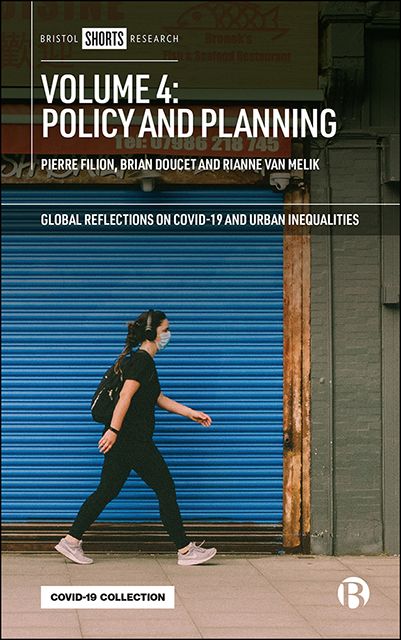Book contents
- Frontmatter
- Contents
- List of Figures and Tables
- Notes on Contributors
- Acknowledgments
- Preface to All Four Volumes of Global Reflections on COVID-19 and Urban Inequalities
- One Introduction: Policy Making in the Face of Uncertainty and Inequality
- Part I COVID-19 and Urban Changes
- Part II The Pandemic, Social Inequality, and Mobilization
- Part III Municipal and Urban Policy Responses
- Index
Nineteen - Distributing, De-Synchronizing, Digitalizing: Dealing with Milan Transport Inequalities in Post-COVID-19 Society
Published online by Cambridge University Press: 25 April 2023
- Frontmatter
- Contents
- List of Figures and Tables
- Notes on Contributors
- Acknowledgments
- Preface to All Four Volumes of Global Reflections on COVID-19 and Urban Inequalities
- One Introduction: Policy Making in the Face of Uncertainty and Inequality
- Part I COVID-19 and Urban Changes
- Part II The Pandemic, Social Inequality, and Mobilization
- Part III Municipal and Urban Policy Responses
- Index
Summary
Introduction
The COVID-19 pandemic has impacted how we perceive and shape our living environment (Klaus, 2020; Shenker, 2020), questioning economic and social inequalities in cities. As the pandemic spread, reflections proposed in the international debate have suggested three possible effects for the future of cities.
The first – paraphrasing the title of an article by Arundhati Roy, ‘the pandemic is a portal between one world and the next’ (Roy, 2020) – interprets the pandemic as an opportunity for rethinking the urban condition, spatial dimensions, and the forms of conviviality, shedding new light on the social divide. In this perspective, the measures ensuring social distancing tested during the emergency and then in the post-lockdown can be thought of as policies to promote a lasting urban turn. The outcome could be a city that is environmentally sustainable, de-carbonized, and more socially just in terms of the distribution of services.
The second perspective considers the pandemic as an accelerator for innovative projects that could be tested, thus taking advantage of the COVID-19 constraints. Some ‘temporary’ emergency measures implemented to deal with social distancing may become permanent policies to improve urban quality from an environmental and equity point of view.
The third interprets the pandemic as a lesson for addressing future disruptive changes, refining our predictive tools for governing interrelated and complex processes under emergency conditions. The changing conditions impose a reframing of the urban scenarios and their evaluation on a different time horizon that calls into question longer-term planning policy.
The chapter describes three approaches driving a Milan plan adopted in April 2020 to deal with the pandemic (Chapter Twenty also addresses adaptation to the pandemic in Milan). One involves a ‘distribution’ of public space so as to reduce the presence of the car and encourage other uses of road and parking space. The second approach consists in ‘desynchronizing’ activities so as to avoid rush hour crowding. Finally, a ‘digitalizing’ strategy aims at improving access to electronic means of communication. The chapter demonstrates that the plan echoed the orientation of an earlier pre-pandemic document. In this sense, the pandemic is perceived as an accelerator that propelled the implementation of measures that would have otherwise taken much longer to see the day.
Milan 2020 document: tactical strategies to deal with COVID-19
The City of Milan published in April ‘Milano 2020.
- Type
- Chapter
- Information
- Volume 4: Policy and Planning , pp. 201 - 210Publisher: Bristol University PressPrint publication year: 2021

